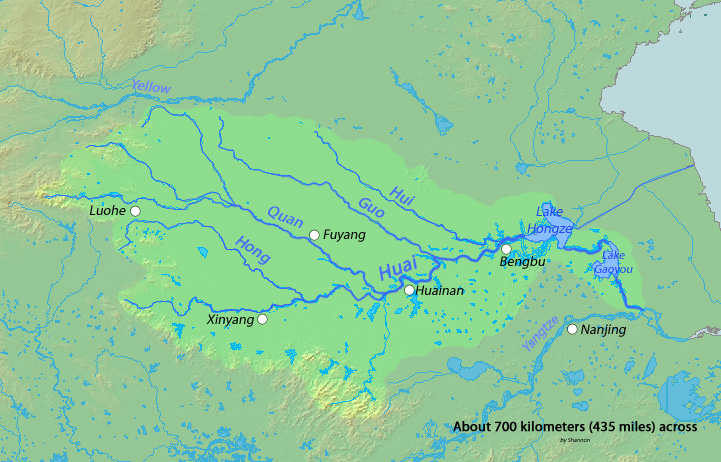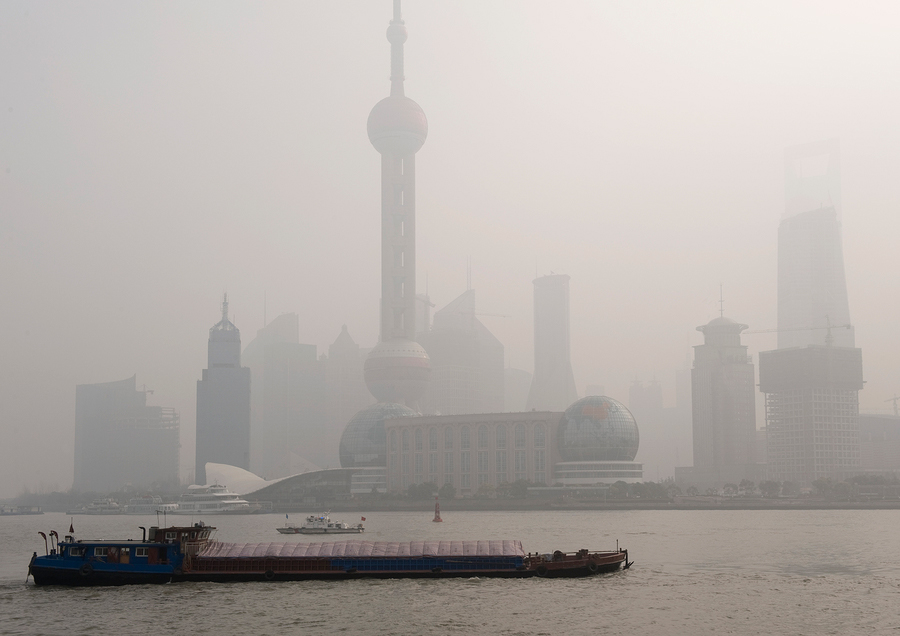July 12, 2013 -- IN THE NEWS: PRI - Coal and Shortened Lives in China
Friday, July 12, 2013
Living on Earth   (Browse all news)
Air pollution has taken a toll on the health of Chinese residents. A person living in the north of the River Huai can expect to lives 5 years less than a person south of the river, an unintended legacy of the government?s policy to give free coal for winter heating in the north of the country. (US Embassy)
New research in China quantifies the relationship between reduced life expectancy and elevated air pollution from coal fired boilers. MIT professor Michael Greenstone tells host Steve Curwood that residents in the north of China live 5 years less on average than those in the south as a result of higher exposure to air pollution from coal combustion.
Transcript:
CURWOOD: Highly polluted air is bad for your health, and that's particularly true when it's air full of small particles from coal-fired power plants, as studies going back for years have shown. But just how bad? Now for the first time, there's a study that actually quantifies how many years of life expectancy are lost to a given amount of particulate exposure. Michael Greenstone is a Professor of Environmental Economics at MIT. He recently published a paper that compared two populations in China that experienced very different levels of polluted air.
GREENSTONE: The basis of the study comes from a Chinese policy that was implemented during the Planning Period.
CURWOOD: This was back in the 1980s we?re talking about.?
GREENSTONE: It dates really from the 1950s to the 1980 period, although the legacy of the policy remains to date. But they didn?t have enough money to provide winter heating for everybody, so they somewhat arbitrarily decided that people who live north of the Huai River, which bisects the country into north and south, would have free winter heating, and that was provided through free coal and building the infrastructure to combust the coal to create heat. And the basis of the study is to compare people who live just north of the river with people who live just to the south of the river. And I should add, in the south, it was forbidden to build heating units.?

So what the study did then is it got data from 1981 to 2000 on pollution, and what we find is pretty dramatic. Living north of the river led to almost 200 micrograms per cubic meter increase in total systemic particulates. Now, of course, most people aren?t familiar with those units, so to put it in context, it was about 350 micrograms per cubic meter in the south, and 550 micrograms per cubic meter in the north, and by comparison, the US average right now is probably 40 or 50. So both the levels are enormous, and the difference between the north and south is also enormous.
CURWOOD: So what did you find when you compared life expectancy for residents in the north versus the south?
?
GREENSTONE: It?s remarkable. So, as I mentioned, just at the river?s edge there?s a jump up in particulates concentrations, and that?s matched by a jump down in life expectancy. Specifically, what we found is people who live north of the Huai River, and were the intended beneficiaries of these policies, have life expectancy about five-and-a-half years less than people who live to the south.
CURWOOD: How many people live in that area to the north?
GREENSTONE: In north China there?s about 500 million people, and so, from that, we deduced that the policy is causing a loss of approximately 2.5 billion life years.
CURWOOD: What kind of illnesses? What kind of deaths were these people going through?
GREENSTONE: All of the effects appear to be coming from elevated mortality rates due to cardiorespiratory causes of disease that are plausibly related to air pollution. So, lung cancer, heart attacks, other respiratory diseases. In contrast, we find no affect on mortality rates associated with causes of death that are non-cardiorespiratory.
CURWOOD: Where you able to break out just how much particulate would lead to just how much lower life expectancy?
?
GREENSTONE: Yes. So, in particular what we find is that an extra hundred micrograms per cubic meter of total suspended particulates is associated with a loss of life expectancy of about three years. And why that?s important is that that can be applied to other settings, both in other countries, and in other parts of China as well.
CURWOOD: Now the wind can carry air pollution from China across the Pacific Ocean to North America. Should people, say, in California be concerned about air pollution from China?
GREENSTONE: There?s always a concern about that, and it would definitely be the smaller particles that would be able to travel that far. I think probably the larger concern for Americans and really everyone who lives on the planet are the increasing rates of carbon dioxide emissions coming from China, which is a completely different pollutant, but is also associated with the combustion of coal and is causing climate change.
CURWOOD: So you don?t worry so much about particulates, you worry about CO2.
GREENSTONE: Yes. I mean, it?s worth emphasizing that China consumes more than half of the world?s coal.
CURWOOD: So what policies does China have now regarding this use of free heat in the north? And what are they doing to address the obvious public health problem?
GREENSTONE: Yes, so the legacy of the policy continues. It?s not quite in the same form. I don?t think the government is running around installing boilers anymore, but they continue to subsidize coal in the north. As an example, I?ve lectured at a university in Chengdu which is a city that?s in the south but it?s in the northern part of the south so they have cold winters. And it was just normal occurrence that when I was lecturing there was no heat in the building and all the students were wearing winter coats. So the legacy of this policy continues today. With respect to policy looking forward, I think what this study has helped to highlight is that consequences of air pollution in terms of human health are greater than what had been previously realized. And perhaps it will tilt the balance as they try to devise the optimal tradeoff between air pollution and increasing incomes.

CURWOOD: What has been the response to your study in China, privately as well as publicly?
GREENSTONE: Two of my co-authors are Chinese. One of them reported that on his microblog he had 300,000 hits in the first eight hours, and that was in response to a post describing the results. I think in the coming days and months, it will be very interesting to see what the impacts are, and the degree to which it affects Chinese policy. Candidly, China has an opportunity here to greatly improve the health of its citizens.
CURWOOD: Michael Greenstone is Professor of Environmental Economics at the Massachusetts Institute of Technology. Thanks so much, Professor Greenstone.
GREENSTONE: Thank you for having me.
Source: http://globalchange.mit.edu/news/news-item.php?id=292
James Gandolfini stock market stock market Vince Flynn Mexico vs Brazil Tim Duncan Kim And Kanye Baby Name

0টি মন্তব্য:
একটি মন্তব্য পোস্ট করুন
এতে সদস্যতা মন্তব্যগুলি পোস্ট করুন [Atom]
<< হোম